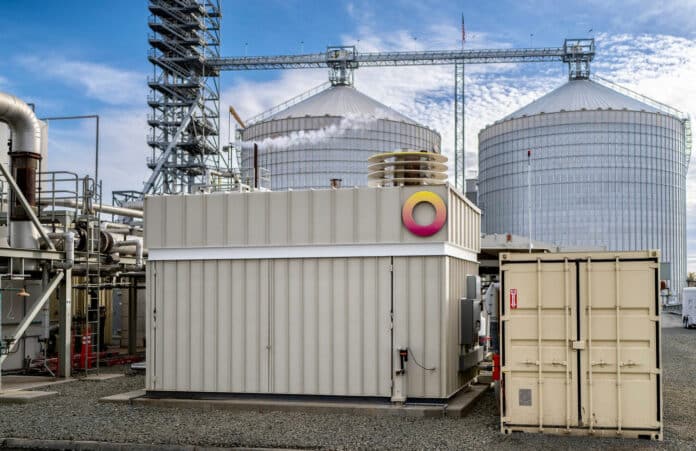A California battery startup, Rondo Energy, has partnered with Portugal-based energy company EDP to open a new market: the supply of clean industrial heat at a large scale and at an affordable cost, powered by wind and sun.
The companies are looking to install Rondo heat batteries that run on renewable electricity generated by decentralized solar projects and long-term contracts such as Power Purchase Agreements of wind and solar EDP assets. This partnership will offer a complete zero-carbon heat and electricity solution for EDP’s European commercial and industrial clients.
EDP plans to develop up to 400 MW of wind and solar projects in the medium term to power up to 2 GWh of Heat Battery installations from Rondo.
EDP will be responsible for developing wind and solar parks, including large-scale and distributed projects. The distributed projects will be co-located with the Rondo Heat Battery, a zero-combustion, low-cost, and safe solution to decarbonize industries that require heat, from food and beverage to chemical complexes and factories.
By capturing intermittent electric power and converting it into continuous high-temperature heat, while also offering an option for continuous power through a combined heat and power (CHP) configuration, the Rondo Heat Battery seems like a versatile and sustainable solution.
Working together, the two companies offer 24/7 renewable heat and power supply contracts to deliver deep decarbonization and energy savings. It’s all powered by competitive renewable electricity from EDP and made possible by the Rondo Heat Battery.
Rondo’s technology can help replace fossil fuels for some of the most challenging sectors to decarbonize and stabilize the grid by adding a highly flexible electricity demand that can soak up renewable power when there is an abundance on the grid. Rondo Heat Batteries are proven at scale to enable low-cost heat and electricity for customers, all from intermittent renewable electricity.
EDP has an impressive track record of deploying around 16 GWs of wind and solar around the world and has made a commitment to being 100% green by 2030. In addition to their renewable energy solutions, EDP is also a global supplier of energy to a wide range of clients, from small and medium-sized enterprises to large industrial customers. Their expertise will be instrumental in accelerating the deployment of Rondo Heat Batteries, which are designed to be a simple and effective replacement for traditional gas-fired boilers. This will enable EDP’s customers to lower costs and achieve deep decarbonization. The first project deliveries with EDP are expected to start in 2025.
“By working with Rondo, we can meet their energy needs for renewable energy and heat in a cleaner, affordable, and reliable way. This partnership opens another decarbonization avenue that EDP wants to lead in Europe,” says Vera Pinto Pereira, an EDP board member.
“The cost of solar has come down so much in the past decade that it’s becoming cost-competitive with gas as a source of energy,” says John O’Donnell, CEO of Rondo Energy. “We are proud to partner with EDP, whose drive, expertise, and excellence in execution have made them a world leader in delivering low-cost wind and solar power to their industrial customers. Working together, Rondo and EDP will deliver 24-hour clean heat to industrial customers at prices competitive with gas and without any factory facility changes. This is a game-changer for Rondo, a game-changer for EDP, and a game-changer for their customers worldwide.”
The potential of repowering industrial heat with renewable energy is enormous, offering a significant opportunity to combat climate change on a global scale. This move can make a huge difference, as the current use of fossil fuels for industrial heat releases 15% of world CO2. According to a recent SystemIQ study on industrial heat, heat battery deployment can reduce worldwide greenhouse gas emissions by 20%, including the elimination of fossil gas combustion by up to 40%. This is a major step forward in our quest for a more sustainable future.
